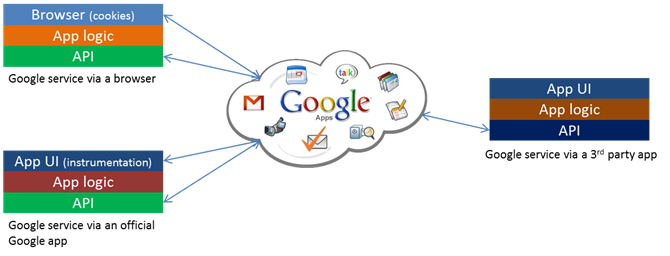
I’m a bit of a privacy nut. I have nothing to hide, but I feel as protective of my personal information as a mother with a new born child. Somehow I WANT to have the option to give up my information when it’s needed, not to have it filched from me unwittingly. Short of hissing “my precioussss!” intermittently while I log onto Facebook, I take minor calculated measures to try to thwart the constant threat of information leakage that opening my browser has become. Heck when I order food and they ask me for my name (to call when my order is ready), I usually just say, “Call me “O” “.
If the kerfuffle about Google’s new privacy policy coming into effect today is to be believed, then thank goodness I’m not alone. Actually if you knew how much most commercial websites knew about you, you would start wearing the digital equivalent of a tin foil hat. How come when I go to political websites I see an ad from Washington Republican candidate for governor on the website? You guessed it; the site is somehow being fed information about my location and fetching an ad that matches where I live. Creepy.
Honestly it’s a complicated topic. Google is not collecting MORE data. They’re just reserving the right to do even more crazy things with it – practically, to profile you better and track you as you move from Google service to Google service. The truth is this: Google is publicly fessing up to what it already does and wants to do more off; which is track you across its many services and store information about you in one place from where it can offer you like a commodity to advertisers. If Google couldn’t quite link your search history with your gmail habits, now it legally can. It’s all about consolidation. Heck, the whole point of Google+ was to fix the fact that they didn’t really know what you were talking about and Facebook did (That’s why I don’t think they’re out to beat Facebook at Social Networking, just get good enough to profile your social life). Ofcourse the pernicious thing about the new privacy policy is that there is not opt out. Submit or quit (we have your data, bub!); a classic hostage situation.
There are a couple of lines of defense (and no, clearing your cookies and search history is really no long term defense):
Bob and Weave
Don’t use all the services from one company. Use picture services from one, feeds from another, blogging from the other. That way it’s that much harder to create a complete profile of you; it’s also a strong defense because these companies don’t like to share data. Or they have to ask your permission. And risk of industry consolidation is low for now (consolidation has already happened and Yahoo is not being bought by the biggies).
Use third party Apps (intermediaries)
The great thing about the rise of the new mobile ecosystems is that they have forced an acceleration of taking back-end systems and making them available from mobile devices and web applications via APIs. In simple terms, lots of companies are opening up, so that people can build apps that use their services. And the great thing about third party apps is that the person who makes is defines the user interface and how you interact with it, not the company that makes the API.
Big companies like Google are very interested in innovative developers doing crazy stuff like putting new snazzy UI on your data and making it more interesting to you (mashups). The upside of this (to you) is that the developer is the one who knows how you use this user interface. Not Google. Now using APIs is not a panacea, but it does provide some moderate protections. Usually a browser is an excuse to collect a lot of data about you with a lot of frightening precision. An app provides fewer opportunities, although you have to know that your data is still being stored on the Google server and they can resort to looking at profile data about you at this level. But at least they don’t know which ads you looked at or use you to run customer experiments because they don’t own the UI you’re using to access the information.

Apps can be abused, no doubt. But they do ameliorate the power of one actor – in this case, Google and other big internet and platform providers. If a third party app pissed you off, you can uninstall it and get one from another provider. It’s comparatively much harder to swear off services that you have been using for the past 10 odd years.
As an aside, the ability of browsers to track you in detail is getting old in this new appified world. I mean seriously??? Each time you open up a browser, you’re really participating in a tacit ecosystem that is designed (or easily subverted) to give up your personal information. Not cool. Someone should (and probably will) fix that.
Ultimately though, I think seeking complete privacy in this environment is futile (sad face) unless new laws are passed to preserve it. On a side note, the EU is way more forward thinking about this than the US.
